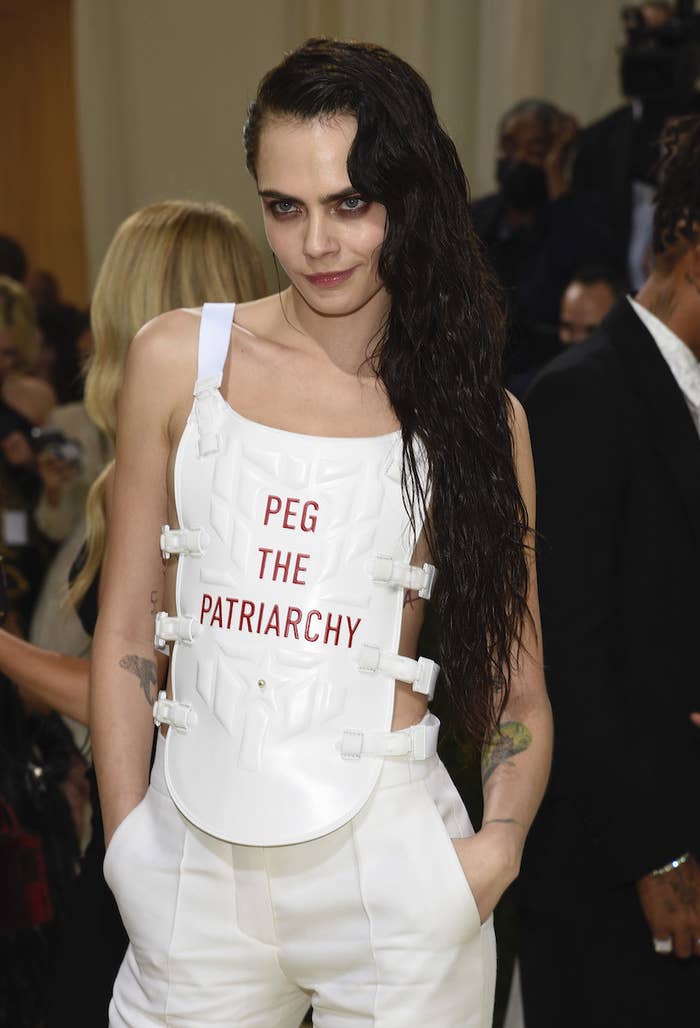
Luna Matatas had just wrapped up teaching a BDSM class on Monday night when she went to Twitter to share highlights from the session. The 41-year-old was shocked to see her mentions skyrocketing on social media.
Supermodel Cara Delevingne had just arrived at the Met Gala donning a white power suit designed by Dior's Maria Grazia Chiuri. The armored vest Delevingne wore over her bear chest bore the phrase "Peg the Patriarchy" in bold red font.
“If someone doesn’t know what this means, you’re gonna have to look it up,” Delevingne said to Vogue correspondent Keke Palmer. “It’s about women empowerment, gender equality — it’s a bit like, ‘Stick it to the man.'"
Then, it sunk in for Matatas. This was her trademarked slogan written across a supermodel's chest, visible to an audience of millions. Matatas, a queer person of color who owns a small business, claims she hadn't received any credit for the phrase that she says she coined, nor had Dior offered to collaborate with her.
Matatas said to BuzzFeed News the moment felt "very David and Goliath."
"When I realized the designer was Dior, I was like 'Oh, God,'" Matatas said. "It's classic appropriation. We're talking about people with a lot of privilege. It really would have been so easy for us to link arms and lift each other up."
BuzzFeed News has reached out to Dior and Delevingne for comment on Matatas' claims. Matatas said she DM'ed Delevingne upon seeing the photos from the red carpet but hasn't heard back.
Matatas is a Toronto-based business owner who said she came up with "Peg the Patriarchy" in 2015. She was running pleasure-based workshops at feminist sex shops at the time. "Pegging" is a sex term referring to an act where one partner dons a strap-on dildo and penetrates the other.
The message is not about literally having sex with pegs. The phrase is more subdued and reflects a "real hunger" Matatas said she noticed among clients to contextualize how gender-based oppression affects sexuality, kink, and fantasy.
"We're using a sexual metaphor to talk about a fantasy of subversion," she said.
on top of everything else, cara delevingne’s dior pegging corset used the trademarked phrase owned by a queer POC sex educator without permission 😵💫 https://t.co/CgGN9IFqX6
Matatas then started her own brand around the anti-patriarchal message and began selling merchandise from her one-bedroom apartment.
"It was such a cool way to connect with people who believed in this message of equity," Matatas said, who now employs two part-time staff and offers a range of workshops, coaching, webinars, and merchandise.
While her trademark is only valid in Canada, Matatas claims her Canadian trademark is typically honored when she submits products to global e-commerce sites and she would expect the same treatment in this case.
Even if she had a US trademark, though, Matatas said she would never be able to afford a legal battle against a global fashion powerhouse such as Dior (which had a revenue of about $53 billion in 2020).
Dior works to shape its image around a message of gender equality. Chiuri famously became the first female artistic director in the brand's history and showed her debut collection at Paris Fashion Week in September 2016. Under Chiuri's leadership, Dior has embraced Instagram influencers and slogans that champion a feminist message. They have done this most famously in the form of T-shirts quoting thought leaders like Chimamanda Ngozi Adichie with phrases like "We Should All Be Feminists" for Dior's 2017 spring collection.
Delevingne is a likely face for Dior's feminist platform. As the co-owner of sexual wellness brand Lora DiCarlo, Delevingne has come to represent sexual freedom the fashion industry hasn't historically embraced.
But Matatas said white, cisgender people like Delevingne "don't face the same kinds of challenges because of their social location." Matatas said small businesses in the sex industry like hers face constant censorship on social media for their content, which hurts their brand awareness and growth.
Her small brand could never access the same advertising scale or influencer resources that big-name brands like Dior can because of these barriers. Even performing sexuality on a red carpet without consequence is a privilege, she said.
In a social media statement following the star-studded gala, Matatas said the whole situation "coughs in colonialism."
This is a pattern for small owners of sex-positive brands, according to Dirty Lola, creator of Sex Ed A Go Go and sex educator. Lola told BuzzFeed News she noticed Delevingne's outfit soon after the gala began. She immediately posted to social media to ensure Matatas got credit for the phrase.
Lola said while it's a good thing to see pleasure products become more widely accepted, she believes brands are pairing with celebrities who "are just talking."
"It's a lot of white women who aren't representing the diversity of the sex industry," Lola told BuzzFeed News, adding that having white, cisgender women like Delevingne wearing the slogan creates more problems than progress.
"People like Luna and myself, we struggle to maintain a hold on social media," Lola said. Matatas has constantly had sexual content flagged or removed from her Instagram, Lola added.
”It's people with money coming into an industry where they see dollar signs," Lola said. "This may not seem like a big thing to a lot of folks but it's really damaging."
Since the Met Gala, Matatas said she has now had to fight a number of fake appropriations bearing her slogan that have popped up.
For context on #PegThePatriarchy: https://t.co/FjpA69JyiF
While Matatas said the visibility has been good for her brand, that's less her focus than pursuing a truly uplifting campaign about the anti-patriarchy cause.
"Let's take something away, distort the message, not have representation, not have credit," Matatas said. "It could have been collaboration. It could have been credit."
